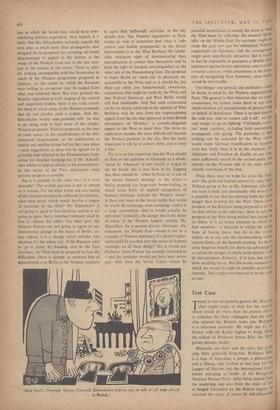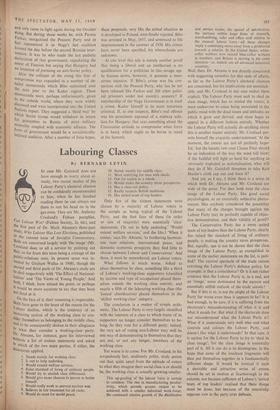Test Case T HERE is one inexpensive gesture Mr. Khrosfr chev
might make in time for the sumnitt which would do more than his present efforts to convince his three colleagues that the wall who ordered the Russian tanks into Budapest is a reformed character. He might use his in- fluence with the Kadar regime to bring about the release of Professor Istvan Bibo, the Hurr garian peasant leader.
Memories are short and the story. has prob- ably been generally forgotten. Professor Bib° is a man of forty-nine, a lawyer, a philosopher and a liberal, who worked at one time for the League of Nations and the International Court before emerging as leader -of the Hungarian National Peasant Party. After being ejected fronl the leadership and also from the chair of law at Szeged University by the Rakosi regime. he survived the years of •terror by self-effacement and only came to light again during the October But during those weeks he, with Ferenc Farkas, reorganised the Peasant Party and in fact represented it in Nagy's last coalition formed the day before the second Russian inter- vention. It was he who made the last pathetic declaration of that government, repudiating the smear of Fascism but saying that Hungary had no intention of pursuing an anti-Soviet policy. After the collapse of the rising this hint of compromise was expanded in a number of de- tailed memoranda which Bibo submitted over the next year to the Kadar regime. These memoranda were, perhaps unfortunately, given to the outside world, where they were widely discussed and were incorporated into the United Nations report. They suggested a 'third way' by Which Soviet troops would withdraw in return for guarantees to Russia of strict military neutrality coupled with economic alliance. The form of government would be a socialistically- inclined coalition. After a number of false hopes, these proposals, very like the actual situation as it developed in Poland, were finally rejected. Bibo was arrested in May, 1957, and sentenced to life imprisonment in the summer of 1958. His crimes have never been specified, his whereabouts are unknown.
At one level this tale is merely another proof that being a liberal and an intellectual is no qualification for a politician in this savage age. In human terms, however, it presents a mon- strous injustice. If Bibo's crime was his con- nection with the Peasant Party, why has he not been released like Farkas and 200 other politi- cal prisoners under last month's amnesty? If membership of the Nagy Government is in itself a crime, Kadar himself is its most notorious criminal. If, as one suspects, Bibo's real offence was his prominent espousal of a midway solu- tion for Hungary, that says something about the Communist attitude to compromise when force is at hand, which ought to be borne in mind at the Summit.





































 Previous page
Previous page